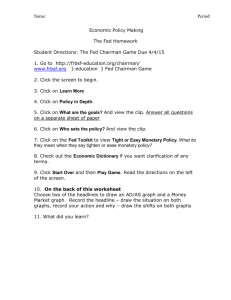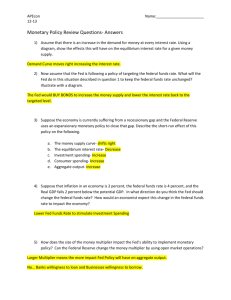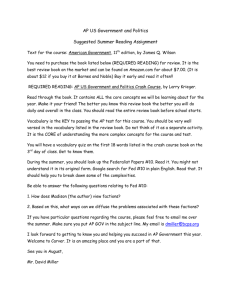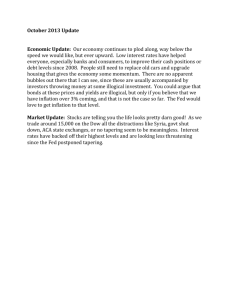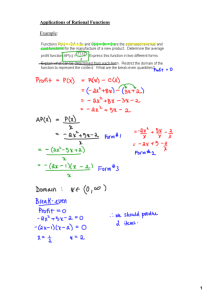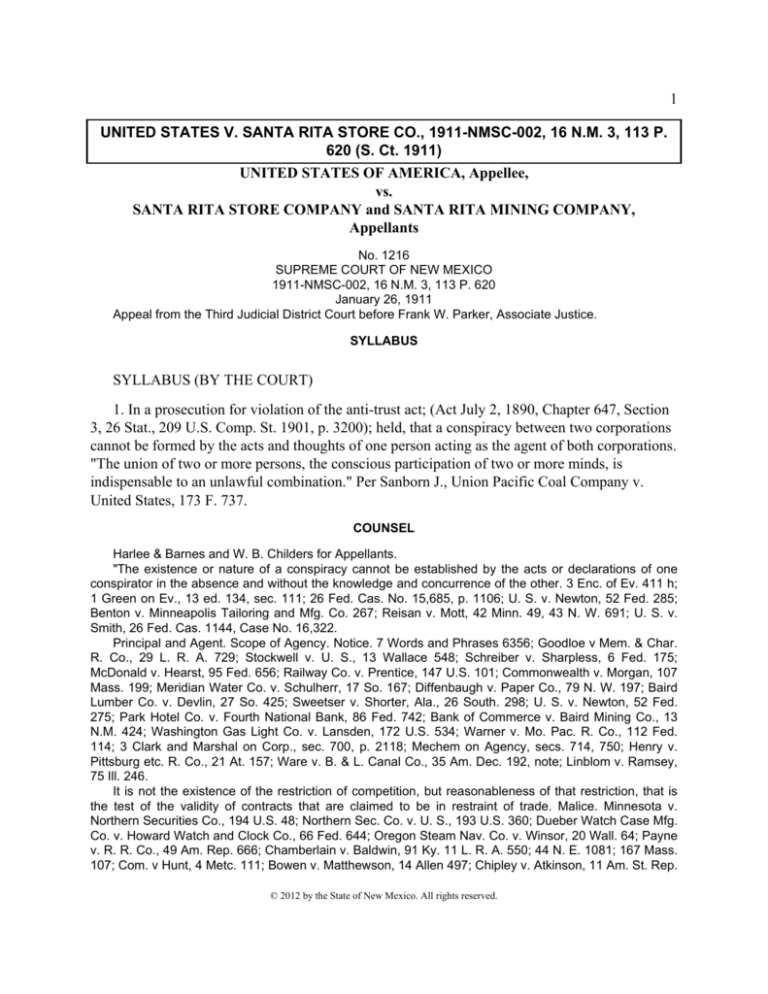
1
UNITED STATES V. SANTA RITA STORE CO., 1911-NMSC-002, 16 N.M. 3, 113 P.
620 (S. Ct. 1911)
UNITED STATES OF AMERICA, Appellee,
vs.
SANTA RITA STORE COMPANY and SANTA RITA MINING COMPANY,
Appellants
No. 1216
SUPREME COURT OF NEW MEXICO
1911-NMSC-002, 16 N.M. 3, 113 P. 620
January 26, 1911
Appeal from the Third Judicial District Court before Frank W. Parker, Associate Justice.
SYLLABUS
SYLLABUS (BY THE COURT)
1. In a prosecution for violation of the anti-trust act; (Act July 2, 1890, Chapter 647, Section
3, 26 Stat., 209 U.S. Comp. St. 1901, p. 3200); held, that a conspiracy between two corporations
cannot be formed by the acts and thoughts of one person acting as the agent of both corporations.
"The union of two or more persons, the conscious participation of two or more minds, is
indispensable to an unlawful combination." Per Sanborn J., Union Pacific Coal Company v.
United States, 173 F. 737.
COUNSEL
Harlee & Barnes and W. B. Childers for Appellants.
"The existence or nature of a conspiracy cannot be established by the acts or declarations of one
conspirator in the absence and without the knowledge and concurrence of the other. 3 Enc. of Ev. 411 h;
1 Green on Ev., 13 ed. 134, sec. 111; 26 Fed. Cas. No. 15,685, p. 1106; U. S. v. Newton, 52 Fed. 285;
Benton v. Minneapolis Tailoring and Mfg. Co. 267; Reisan v. Mott, 42 Minn. 49, 43 N. W. 691; U. S. v.
Smith, 26 Fed. Cas. 1144, Case No. 16,322.
Principal and Agent. Scope of Agency. Notice. 7 Words and Phrases 6356; Goodloe v Mem. & Char.
R. Co., 29 L. R. A. 729; Stockwell v. U. S., 13 Wallace 548; Schreiber v. Sharpless, 6 Fed. 175;
McDonald v. Hearst, 95 Fed. 656; Railway Co. v. Prentice, 147 U.S. 101; Commonwealth v. Morgan, 107
Mass. 199; Meridian Water Co. v. Schulherr, 17 So. 167; Diffenbaugh v. Paper Co., 79 N. W. 197; Baird
Lumber Co. v. Devlin, 27 So. 425; Sweetser v. Shorter, Ala., 26 South. 298; U. S. v. Newton, 52 Fed.
275; Park Hotel Co. v. Fourth National Bank, 86 Fed. 742; Bank of Commerce v. Baird Mining Co., 13
N.M. 424; Washington Gas Light Co. v. Lansden, 172 U.S. 534; Warner v. Mo. Pac. R. Co., 112 Fed.
114; 3 Clark and Marshal on Corp., sec. 700, p. 2118; Mechem on Agency, secs. 714, 750; Henry v.
Pittsburg etc. R. Co., 21 At. 157; Ware v. B. & L. Canal Co., 35 Am. Dec. 192, note; Linblom v. Ramsey,
75 Ill. 246.
It is not the existence of the restriction of competition, but reasonableness of that restriction, that is
the test of the validity of contracts that are claimed to be in restraint of trade. Malice. Minnesota v.
Northern Securities Co., 194 U.S. 48; Northern Sec. Co. v. U. S., 193 U.S. 360; Dueber Watch Case Mfg.
Co. v. Howard Watch and Clock Co., 66 Fed. 644; Oregon Steam Nav. Co. v. Winsor, 20 Wall. 64; Payne
v. R. R. Co., 49 Am. Rep. 666; Chamberlain v. Baldwin, 91 Ky. 11 L. R. A. 550; 44 N. E. 1081; 167 Mass.
107; Com. v Hunt, 4 Metc. 111; Bowen v. Matthewson, 14 Allen 497; Chipley v. Atkinson, 11 Am. St. Rep.
© 2012 by the State of New Mexico. All rights reserved.
71; Cohens v. Virginia, 6 Wheat. 264; Harriman v. Northern Securities Co., 197 U.S. 291; Field v. Barber
Asphalt Co., 194 U.S. 623; Hopkins v. U. S., 171 U.S. 578; Addyson Pipe Co. v. U. S., 175 U.S. 211;
Swift & Co. v. U. S., 196 U.S. 396; Aikens v. Wisconsin, 195 U.S. 194; Commonwealth v. Peaslee, 177
Mass. 267; Leloup v. Port of Mobile, 127 U.S. 640; Crutcher v. Kentucky, 141 U.S. 47; U. S. v. E. C.
Knight Co., 156 U.S. 1; Kidd v. Pearson, 128 U.S. 1; Sedgwick Statutory and Const. Law, 2 ed. 309;
Dwarris on Statutes, 653; Hyde v. Cogan, 2 Doug. 702; 1 Eddy on Combinations, secs. 47, 48, 560, 570;
2 Eddy on Combinations, secs. 68, 726, 727, 800, 802, 807; Boyer v. W. U. Tel. Co., 124 Fed. 248;
Toledo & A. A. & M. Ry. Co. v. Pa. Co., 54 Fed. 738; Payne v. Atl. R. R. Co., 49 Am. Rep. 666; In re
Greene, 52 Fed. 104; U. S. v. Joint Traffic Assoc., 171 U.S. 567; Hopkins v. U. S., 171 U.S. 578; Whitwell
v. Continental Tobacco Co., 125 Fed. 455; Phillips v. Iola Portland Cement Co., 125 Fed. 594; Anderson
v. U. S., 171 U.S. 604; Smith v. Ala., 124 U.S. 465; Prescott, etc. Ry Co. v. A. T. & S. F. Ry. Co., 73 Fed.
438; West Va. etc. Co. v. Standard Oil Co., 88 Am. State Rep. 896; Mogul S. S. Co. v. McGregor, 21 Qb.
Div. 544; Continental Ins. Co. v. Underwriters of the Pacific, 67 Fed. 314; McCauley v. Tierney, 33 Atl. 2;
Heywood v. Tillotson, 75 Me. 225, 46 Am. Rep. 373; Bohn Mfg. Co. v. Hollis, 55 N. W. 1119, 21 L. R. A.
337; Chambers v. Baldwin, 11 L. R. A. 545; 19 A. & E. Enc. of Law 625; Boyson v. Thorn, 98 Cal. 583, 33
Pac. 490; McCune v. Norwich City Gas Co., 50 Conn. 524; Orr v. Home Mutual Ins. Co., 12 La. Ann. 255;
Crow v. Building Trades Council, 97 N. W. 763, 63 L. R. A. 759; Ertz v. Produce Exchange, 81 N. W. 837,
40 L. R. A. 90; Cote v. Murphy, 159 Pa. 433, 28 Atl. 190; Smith v. Johnson, 76 Pa. St. 191; Glender v.
Uhler, 75 Pa. St. 467; Payne v. Chandler, 34 N. Y. 385, 32 N. E. 18; People ex rel Burnham v. Flynn, 100
N. Y. Supp. 31; Phelps v. Noland, 72 N. Y. 39; Chambers v. Baldwin, 91 Ky. 121, 11 L. R. A. 545; Bourlier
v. McCauley, Ky., 11 L. R. A. 550; Jenkins v. Flower, 24 Pa. St., 11 L. R. A. 545.
In criminal cases, charging in the language of the statute is not sufficient. 26 Stat. L. 209; in re
Greene, 52 Fed. 104; U. S. v. Cruikshank, 92 U.S. 542; U. S. v. Cook, 17 Wallace 158; U. S. v. Carl, 105
U.S. 613; U. S. v. Armstrong, 2 Curt. 446; U. S. v. Coppersmith, 4 Fed. Rep. 198; U. S. v. Simonds, 96
U.S. 360; U. S. v. Britton, 107 U.S. 655, 2 Sup. Ct. Rep. 512; U S. v. Trumbull, 46 Fed. Rep. 755; 2 Story,
Const., sec 1875; Commonwealth v. Clifford, 8 Cush., Mass. 215; Comm. v. Bean, 11 Cush. 414, 14
Gray 52; Com. v. Milburn, 119 Mass. 297; U. S. v. Patterson, 55 Fed. 605; U. S. v. Milner et al, 36 Fed.
890; Com. v. Hunt, Mass., 4 Met. 111; in re Corning, 51 Fed. 205.
Public Policy. 26 Stat. L. 209; 8 Words and Phrases 7038; U. S. v. Patterson, 55 Fed. Rep. 640;
Queen Ins. Co. v. State, 22 L. R. A. 490; Sedgwick on Statutory and Const. Law, 2 ed 309; Continental
Ins. Co. v. Underwriters, 67 Fed. 314; Cote v. Murphy, 159 Pa. St. 420, 25 At. 190; Boyer v. Western
Union Tel. Co., 124 Fed. 248; Payne v. Ry. Co., 49 Am. Rep. 670; Allen v. Flood, 1 Eddy, sec. 482;
Sharp v. Whitside, 19 Fed. 156; Carroll v. Giles, 9 S. E. Rep. 423.
The business of a rival may be lawfully purchased for the purpose of getting rid of competition.
Gamble v. Queens Co. Water Co., 123 N. Y. 91; Diamond Match Co. v. Roebe, 106 N. Y. 473; Rufferty v.
Buffalo Gas Co., 37 N. Y. App. Div. 618; Trenton Potteries Co. v. Olymphant, 56 N. J. Eq. 680; Oakdale
Co. v. Garsh, 18 R. I. 484; Minnesota v. Northern Securities Co., 194 U.S. 48; Northern Sec. Co. v. U. S.,
193 U.S. 332; U. S. v. Joint Traffic Assoc., 171 U.S. 571.
Instruction asked to find defendants not guilty. U. S. v. Hamilton, 26 Fed. Cas. 90, Case No. 15,288.
Instructions requested and refused. U. S. v. Newton, 52 Fed. 282; People v. Powell, 63 N. Y. 88.
Errors in giving instructions. 2 Thompson on Trials 1682, sec. 2326; People v. Powell, 63 N. Y. 92;
Continental Ins. Co. v. Underwriters, 67 Fed. 319; Oliver v. Hutchinson, 69 Pac. 139; People v. Dumar, 5
N. Y. Cr. Rep. 55; State v. Smith, 71 Pac. 767; State v. Boyle, 28 Iowa 522.
W. H. H. Llewellyn, Special Assistant to the U. S. Attorney General, and D. J. Leahy, United States
District Attorney, for Appellee.
Any act done, or any declaration made, by any one of the conspirators in the furtherance or
perpetration of the alleged conspiracy may be given in evidence against himself or his co-conspirators. 4
Elliott on Evidence 203, secs. 2934, 2939; 8 Cyc. 679, 682; Kelly v. People, 52 N. Y. 565; Tucker v.
Finch, Wis., 27 N. W. 817; U. S. v. Newton, 52 Fed. 285; U. S. v. Cassidy, 67 Fed. 698; U. S. v.
Lancaster, 44 Fed. 896; McKee v. State, 111 Ind. 378, 12 N. E. 510; Riehl v. Evansville Foundry Assoc.,
Ind., 3 N. E. 633; People v. Saunders, 25 Mich. 119; 2 Wigmore on Evidence 1282, sec. 1079; Wharton's
Criminal Evidence, 9 ed. 599, sec. 698 a; McClain Crim. Law, sec 989; State v. Thompson, 69 Conn.
720, 38 Atl. 868; State v. Jackson, 82 N. C. 565; Luttrell v. State, 31 Tex. Crim. 493, 21 S. W. 248; State
v. Bolden, 109 La. 484, 33 So. 571; State v. Winner, 17 Kan. 298; State v. Miller, 35 Kan. 328, 10 Pac.
865; Harris v. State, 31 Tex. Crim. 411, 20 S. W. 916; Cox's case, 8 Tex. App. 254; State v. Jackson, 82
N. C. 565; State v. Raiter, 52 W. Va. 132, 43 S. E. 238; Cain's Case, 20 W. Va. 679; Amery v. State, 10
Tex. Crim. App. 199.
The acts of an agent of a corporation, if done within the apparent scope of the agent's general
authority, are the acts of the corporation even to the extent of rendering the corporation criminally
responsible for such acts. Com. v. Proprietors of New Bedford Bridge, 2 Gray, Mass. 339; Clark and
Marshall on Private Corporations 648, secs. 246-257; State v. Louisville & Nashville R. Co., 91 Tenn.
445; Reynolds v. Witte, 13 S. C. 5, 36 Am. Rep. 678; Matteson v. Rice, 116 Wis. 328, 92 N. W. 1109;
Adams Mining Co. v Senter, 26 Mich. 73; Phillips & Buttorf Mfg. Co. v. Whitney, Ala., 20 So. 333; U. S. v.
Freight Assoc., 166 U.S. 290; Addyson Pipe & Steel Co. v. U. S., 175 U.S. 211; State v. Heldenbrand, 62
Neb. 136, 87 N. W. 25; 3 Greenleaf on Evidence, sec 21; 1 Wharton's Criminal Law, 10 ed., secs. 23 a,
188; Com. v. Mash, 7 Met. 472; Clark & Marshall on Crimes 78, sec 56 a; People v. Roby, 52 Mich. 577,
18 N. W. 365; People v. Blake, 52 Mich. 576, 18 N. W. 360; Com. v. Kelley, 146 Mass. 441, 5 N. E. 834;
Com. v. Connelly, 40 N. E. 862; People v. Waldvogel, Mich., 13 N. W. 620; Clark & Marshall on Crimes
265; 11 Enc. P. & P. 246; Weller v. Hawes, 49 Iowa 45; Campbell v. Ormsby, 65 Iowa 518; Pierce v.
Milloy, 62 Ill. 133.
Whatever combination has the direct and necessary effect of restricting competition, is, within the
meaning of the Sherman Act as now interpreted, restraint of trade. U. S. v. Swift & Co., 122 Fed. 529;
Freight Association Case, 166 U.S. 290, 17 S. C. 540, 41 L. ed. 1007; Traffic Case, 171 U.S. 558, 19 S.
C. 25. 43 L. ed. 259; Northern Securities Co. v. U. S., 193 U.S. 197; Stewart v. Transportation Co., 17
Minn. 372; U. S. v. Debs, 64 Fed. 724; in re Debs, 158 U.S. 564; Ellis v. Inman, Pouken & Co., 131 Fed.
183; State v. Rowley, 12 Conn. 101; State v. Buchanan, 5 Har. & J., Ind. 317; Com. v. Mifflin, 5 W. & S.
461; Twitchell & Norton v. Com., 9 Pa. St. 211; State v. Donaldson, 32 N. J. L. 151; King v. Leigh, 2
Macklin's Life 217; Clifford v. Brandon, 2 Camp. 358; King v. Eacles, 3 Douglass 337; Rex v. Cope, 1 Str.
144; 6 A. & E. Enc. Law, 2 ed. 861; Webb v. Drake, 52 La. Ann. 290, 26 So. 791; Hopkins v. Oxley Stove
Co., 83 Fed. 912; Mogul Steamship Co. Ltd. v. McGregor, Gow & Co., 21 Q. B. Div. 544.
Penal laws are to be construed strictly but they are not to be construed so strictly as to defeat the
obvious intention of the legislature. U. S. v. Wiltberger, 5 Wheat. 76; Northern Securities Co. v. U. S., 193
U.S. 197; Mckee v. State, 111 Ind. 378, 12 N. E. 510; U. S. v. Newton, 52 Fed. 275; U. S. v. Cassidy, 67
Fed. 698; 8 Cyc. 685; Regina v. Murphy, 8 C. P. 297, 34 E. C. L. 744; U. S. v. Hopkins, 82 Fed. 529.
A conspiracy may and nearly always must be proven by circumstantial evidence. U. S. v. Newton, 52
Fed. 275; Archer v. State, 106 Ind. 426; Grimes v. Bowerman, 92 Mich. 458, 52 N. W. 751; Horton v. Lee,
106 Wis. 439, 82 N. W. 360; Patuode v. Westenhove, 114 Wis. 460, 90 N. W. 467; State v. Thompson,
69 Conn. 720, 38 A. 868; People v. Peckens, 153 N. Y. 576, 47 N. E. 883; Kelley v. People, 55 N. Y. 565;
4 Elliott on Evidence, sec. 2936; People v. Bentley, 75 Cal. 407, 17 Pac. 436; People v. Saunders, 25
Mich. 119; McKee v. State, 111 Ind. 378, 12 N. E. 510; U. S. v. Newton, 52 Fed. 275.
Sufficiency of indictment. Rev. St., sec. 5440; Wright v. U. S., 108 Fed. 805, 48 C. C. A. 37; State v.
Berry, 21 Mo. 504; State v. Grant, 86 Iowa 216, 53 N. W. 120; 8 Cyc 667, 669; U. S. v. Gordon, 22 Fed.
250.
Public Policy. In re Greene, 52 Fed. 104; U. S. v. Cassidy, 67 Fed. 698.
JUDGES
Mechem, J. Roberts, A. J., who was not a member of the Court when the case was submitted, did not
participate in this decision.
AUTHOR: MECHEM
OPINION
{*8} OPINION OF THE COURT.
{1} 1. The appellants, the Santa Rita Mining Company and the Santa Rita Store Company,
were jointly indicted with one John Deegan and one William Young for a violation of Section 3,
Act of Congress, approved July 2, 1890, Chapter 647, 26 Stat. at Large 209, which is as follows:
"Sec. 3. (Trusts, etc., in Territories {*9} or District of Columbia illegal -- persons combining
guilty of misdemeanor.) Every contract, combination in form of trust or otherwise, or conspiracy,
in restraint of trade or commerce in any Territory of the United States * * * is hereby declared
illegal. Every person who shall make any such contract or engage in any such combination or
conspiracy, shall be deemed guilty of a misdemeanor, and, on conviction thereof, shall be
punished by fine not exceeding five thousand dollars, or by imprisonment not exceeding one
year, or by both said punishments, in the discretion of the court." (26 Stat. L. 209). The
appellants were convicted. Deegan and Young were acquitted.
{2} The record shows that the appellants are New Jersey Corporations, the mining company
owning and operating mines at Santa Rita, Grant County, New Mexico, and the Store Company
carrying on a general merchandise business at the same place. Deegan was the general agent in
charge of the business of both companies, and Young was an employee under Deegan. No other
officer of either company lived or was in New Mexico during the period named in the
indictment, or at any time thereafter. Deegan reported to one Broughton in New York, who had
charge of the New York Offices of the Companies and no other officer of either company is
mentioned in the record of this case. The indictment charged that the defendants conspired to
coerce and compel the employes, lessees and tenants of the appellant to trade exclusively with
the Santa Rita Store Company, and as an overt act further charged that on the 10th day of
January, 1905, the defendants ordered the employees, lessees and tenants of appellants to quit
trading with C. L. Turner & Son, of Santa Rita, a firm competing with the Santa Rita Store
Company, with the threat that any employe would be discharged, and any lessee would be
refused a renewal of his lease who failed to comply with said order. There was no evidence that
any officer or agent of either of appellants, (other than Deegan) participated in or had knowledge
of the acts of which complaint is made.
{3} Undoubtedly, a conspiracy might be formed by two {*10} corporations acting through
agents, yet there must be more than one agent or more than one person actually engaged in the
formation of the conspiracy. In this case a conspiracy was not formed because of a lack of
persons. Deegan could not conspire with himself; neither could two or more corporations
conspire alone by means of Deegan. Had some other officer or agent of either corporation
participated in, or had knowledge of, the scheme, then a conspiracy might have been formed
between the two defendant corporations. "The union of two or more persons, the conscious
participation in the scheme of two or more minds, is indispensable to an unlawful combination,
and it cannot be created by the action of one man alone." per Sanborn, J., in Union Pacific Coal
Company v. United States, 173 F. 737.
{4} The trial court should have sustained the motion made by appellants for an instructed
verdict. For the foregoing reasons, the judgment of the lower court is reversed and the case
remanded.
——————————



